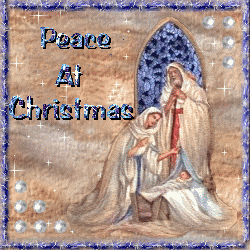Today’s passage from St Matthew’s gospel comes at the end of a genealogy, tracing the earthly origins of the family of Jesus. Matthew begins with Abraham, whereas Luke traces back as far as Adam and Eve and the origins of all humanity. The tracing of ancestors seems to have gained in popularity in recent times and I have done some of this with my own family. It can be intriguing to see whether we are of noble stock or whether we have a bandit in the family. But I wonder whether the reason more people seem to be doing this is because we can often feel the effects of rapid change in our society and the wider world. Sometimes it can leave us feeling a bit rootless; feeling a connection with people in times past might help us to ground ourselves.
It seems that Matthew wants to ground the story of Jesus within the story of the Jewish people. Something new was about to take place, but it wasn’t disconnected from the experience and the history of the people of Israel. All that the patriarchs had prepared and all that the prophets had proclaimed would be brought to fulfilment in Jesus. He is the human form of the Immanuel whom Isaiah wrote about, a name which means: “God-is-with-us”. Jesus has all the heritage that justifies his recognition as Messiah. He is from King David’s house and line, but we see that he is also so much more.
The thing that makes Jesus different is that he was not only chosen by God, like David was, but was conceived by the Holy Spirit and born of the Virgin Mary. Today we are reminded of the way in which Mary was overshadowed by the Holy Spirit, as St Luke’s gospel tells us. She was the one who was deemed morally suitable to carry the divine Word in her womb and to bring him to birth. We are told that this was not the work of human flesh, but the power of God at work in human life. I am sure that God could save humanity without our help, but this is not how God chose to act. It was through human beings that we were to be saved. When Mary says yes to God, all things become possible for humanity.
Unlike Luke’s gospel, Matthew chooses to look at the scene through the eyes of Joseph. He is revealed to us as a considerate and honourable man, who wants to do the right thing both for God and for Mary, his betrothed. We see compassion in his decision not to subject Mary to public disgrace and punishment. But we see something else too. Joseph is open to God. His sensitivity to the message of God comes through in his dream, where the angel appears to him and tells him not to be afraid and to take Mary as his wife. The message of the coming birth of Jesus is revealed by the angel not only to Mary but to Joseph too. So, Joseph not only listens to God, but also responds to God. We see further examples of his obedience in the time ahead.
But the focus of the gospel is on Jesus. For all that Matthew is concerned to show the earthly line of Jesus, he is keen above all to let us know that Jesus was conceived by the Holy Spirit. He is the true Messiah. The birth of Jesus took place in fulfilment of the word of the prophet. So, Matthew sheds new light on the passage from Isaiah 7:14: “The Virgin will give birth to a son and they will call him Emmanuel.” (Immanu, meaning with us and El, meaning God.). Until then, God had been seen only as the one who was “above us”. Even now, there are still many people – and perhaps we can sometimes be among them – who retain this image of a distant God – a God who only looks down on us and counts our good acts and our bad ones. What the gospel reveals to us is that our relationship with God is something much more intimate than that.
Further on in the gospels, we see what it means that Jesus is God-With-Us. In fact he was given a fairly common name rather than one which was very different. We get all kinds of wonderful names nowadays at baptisms, but Jesus was quite a widespread name at the time – a name derived from the Hebrew name Joshua, which is a cry to the Lord for deliverance: “O God, save us!” His name proclaims his mission as the one who would save his people from their sins.
The kingdom of God, which is revealed to us in the later chapters is one that reflects the righteousness, mercy and compassion that we see in Joseph, the legal earthly father of Jesus. It is Jesus who would show God’s mercy to tax collectors, prostitutes, lepers, Samaritans - even to the Pharisees when they wanted to listen. No one is judged an outsider or seen as beyond redemption.
Behind the genealogy at the beginning of the gospel is the story of human beings who can be good, but can also go badly wrong. Much like the whole of humanity. By giving the world the gift of his Son, God chooses not to condemn the world but to remain faithful to the people of his own creation. There is always hope for you and me, because God has called and chosen us to follow Jesus, to proclaim his word and works and to experience for ourselves the compassion, forgiveness and peace that he came to bring. In a broken and suffering world, with so many examples of human failure, this special season reminds us that God has not forsaken us but is still with us. He is with us in Christ. Therefore we have hope.

 RSS Feed
RSS Feed